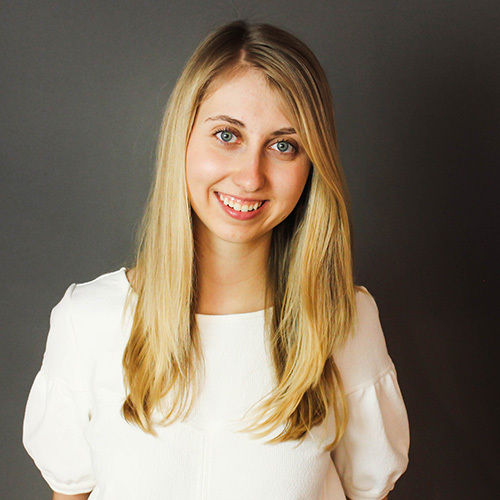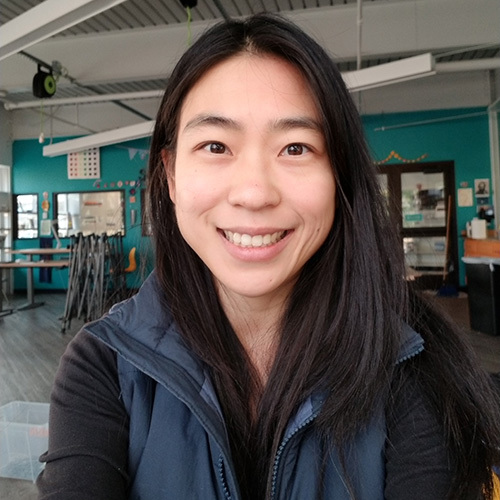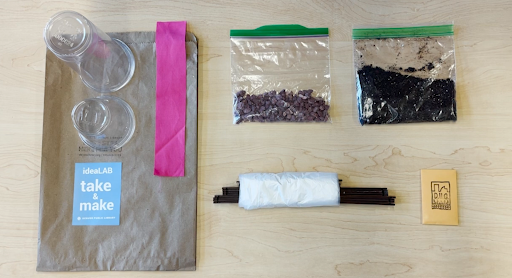In 2021, educators from throughout the United States of America were invited to participate in the Maker Learning @ Home cohort, a six-month professional learning experience for educators committed to continuing opportunities for making while learners are at home.
Throughout their work, cohort members documented the planning, design, and implementation of their projects, as well as offering reflections and lessons learned.
Andrea Devore is a designer, coder, and educator at heart. She loves creating with all types of technologies and empowering others to do the same. Throughout her career, she has applied her skillset in a wide array of educational settings, working with education technology companies, maker events, learning design research labs, coding camps, afterschool programs, libraries, and museums.

Prior to her current position at Denver Public Library (DPL), Carly Tam worked across a variety of higher and adult education programs as an English as a Second Language instructor. She has worked with students from almost all corners of the world and has especially been invested in working with immigrant and refugee populations. Carly holds a B.A. in linguistics from SUNY Binghamton and an M.A. in TESOL from Columbia University.

During the initial COVID-19 closure of our spaces, we started virtual Maker Meetups to try connecting with customers. However, the initial format did not replicate the level of community engagement that we experienced in our labs. We wanted to move away from the “show and tell” format to a more collaborative format so participants could share a making at-home experience and learn from one other.
We found one of the most popular conversations was around gardening; customers would regularly show off their home gardens and offer advice to others who were also interested in gardening. Even before the closure of our spaces, an ideaLAB colleague had set up lights in their lab to start some seeds for their garden at home. The plants attracted a lot of attention and questions from patrons about gardening, which informally demonstrated a high level of community interest surrounding gardening.
For the second iteration of virtual maker meetups, the ideaLABs shifted to offering “take and make” kits in conjunction with the virtual programming. We decided to use these “take and make” kits as a pilot program for our larger gardening vision. Our goal for the kits was to help customers start a small herb garden at home, regardless of access to outdoor gardening space.
With the aforementioned community interest in mind, as well as the exacerbated food insecurities due to COVID-19, we wanted to design an at-home experience to support customers in gardening at home as well as spark conversations around food. Some of our initial ideas for supporting gardening at home included: expanding the seed library currently in DPL, offering gardening programs, starting a gardening tool library, collaborating with local organizations, creating a community recipe book, and supporting culturally sensitive conversations around food.
The majority of the participant questions recorded during the workshop revolved around plant care. For example, there were various questions about lighting—direct vs indirect lighting, how many hours of light should the plant be exposed to, and the best ways to provide light when growing plants indoors. Participants had the opportunity to discuss and research these questions.
The survey responses to the question “What did this project make you curious about?” similarly revolved around plant care tips and tricks, along with a suggestion to have a follow-up workshop to check in and see how the plants were doing.
Participant responses from the workshop and survey confirmed substantial community interest in gardening and provided a strong direction for future programming ideas. For example, the various questions regarding best practices for successful gardening suggest that programming targeted toward novice gardeners would be a good area to explore. There were also requests for more seed types, which pointed us in the direction of exploring potential seed library ideas.
After some research, we decided the kit would include a self-watering planter and a DIY tabletop greenhouse. However, most kits we researched cost two to three times our budget, which was $2.55/kit for 150 kits. Based on budget limitations, we researched and prototyped several designs using different materials. Our initial kit design was approximately $5/kit, but by using different materials, we ultimately designed the same kit experience for less than $2/kit.
To reach participants where they were, kits were distributed at all six ideaLAB locations throughout the city. For every set of instructions, we created both digital and paper instructions. Every kit included a printed version of the instructions in English and Spanish. Additionally, a link was provided to the Instructables page with the same instructions as well as a video. People at home could make with the materials they picked up at the branch during the two-week distribution period. People could also make it at home using their own materials and tapping into our virtual “follow-along” option.

ideaLAB kit
Carrying out this project showed stakeholders our commitment to building out more programs and services around seeds and gardens. We highlight several groups with which we have started collaborating because of this project.
We reached out to an internal DPL group focusing on food access by looking into how DPL can better support access to food in the Denver community. The members of this group bring a wealth of seed and food knowledge; they have attended training and seminars on everything from seed harvesting to seed patents to selecting regionally sensitive seeds. One of their projects has been expanding the seed libraries currently offered at two different branches. During the pandemic, the food access group developed a seed packet distribution program where community members could request up to three pre-packaged seed bundles for pick up at certain branches. Because the group received several hundred responses in 24 hours, they had to temporarily shut down their request form. For us, this further confirmed our community’s interest in seeds and gardens.
We are now collaborating with this group to expand and create a cohesive and sustainable seed library system within DPL. As a starting point, they provided a spreadsheet of materials and equipment for consideration in building out a sustainable system-wide seed library. We are now looking into establishing seed libraries at the Rodolfo ‘Corky’ Gonzales (GON) and Sam Gary Branch (SGB) ideaLABs. Because these labs are located on opposite sides of the Denver metro area, they are an ideal expansion point for seed distribution and a starting point for seed collection. We imagine offering both seeds and live herbs as well as materials for the self-watering planter and greenhouse kit to assemble and plant at home.
The Cultural Inclusivity Committee runs the Plaza program at DPL. Plaza is a program that offers citizenship, computer, job, and homework help, as well as a space for community members to practice English as a Second Language through casual conversation tables. Food tends to be one of the most popular topics at the conversation tables, and we proposed an idea to host a series of workshops at these conversation tables about greenhouse kits and gardening.
Inspired by another Plaza project Mementos from Home, we hope to incorporate opportunities to share personal stories around food and recipes in various mediums. One idea is to start in-lab scrapbooks where customers can share photos/stories about plants, food, and recipes.
The Teen Advisory Board, a group of teens who give input on teen programming, at the GON branch library is exploring the idea of creating a community garden. Since this plan closely aligns with our future goals (establishing a sustainable seed library system and providing basic gardening programming) we reached out about future collaboration.
Our kit and workshop both confirmed community interest in seeds and gardening and provided a solid “proof of concept” for future collaborations. We know investing our time and resources into this topic will be well received by our community. The following are some of our lessons learned throughout this experience: